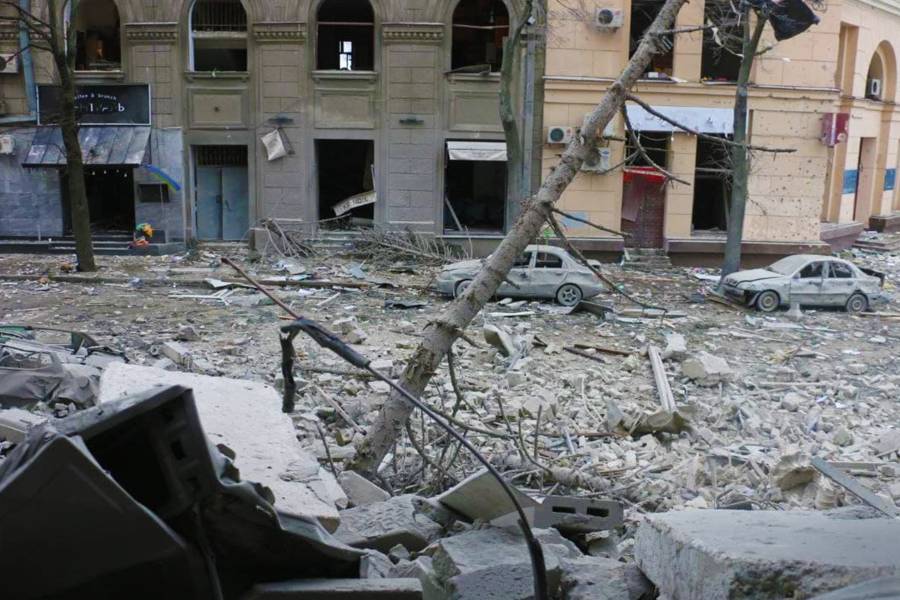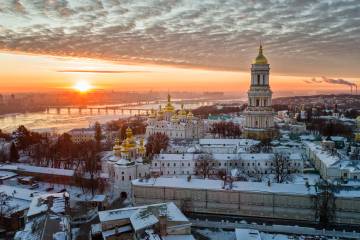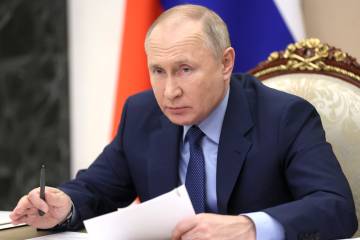Russia's invasion in Ukraine has stretched into its second week, a widening and escalating conflict that has left thousands dead and forced hundreds of thousands to flee in search of safety. Reports indicate that Russia has faced stiffer-than-expected resistance from Ukrainian armed forces and civilians and has also encountered logistical and operational difficulties, denying it a swift military victory. But Russian bombardments of Ukrainian cities have increased in force in recent days, particularly in Kharkiv in the east and Mariupol in the south, and Russia appears to be readying for an assault on Kyiv, Ukraine's capitol city and home to an estimated 2.9 million people.
A swift end to the conflict appears unlikely as Ukrainian officials warn of a growing humanitarian crisis. Western nations have come to Ukraine's aid by supplying weapons and other assistance and bolstering their own military budgets but have shown no interest in being drawn into conflict with a nuclear superpower.
Amid ongoing conflict between Russia and Ukraine, the Johns Hopkins University School of Advanced International Studies convened an expert panel Monday to discuss the situation as part of its Dean's Speaker Series. Moderated by SAIS Dean James Steinberg, the panel focused on issues of Russian foreign policy, Ukrainian resistance, the historical context for the invasion, and the U.S. and European response to the crisis.
Central to the discussion of Russia's invasion is the question of Putin's motivation for the siege. The Russian president cites threats from NATO, but Anne Applebaum, a Pulitzer prize-winning historian and a senior fellow at the SNF Agora Institute and SAIS, said the NATO argument is a red herring. Instead, she said that Putin is motivated by a fear of the democratic values Ukraine has embraced in the past decade. In recent public appearances, she said, Putin has more or less admitted this to be the case.
"He had a line in one of his paranoid television appearances about 'influence from the West coming to us from Ukraine.' What he means is the influence of democratic ideas, ideas about transparency, about the rule of law—all of which could potentially damage his autocratic, kleptocratic political system that keeps him in power," Applebaum said.
A similar red herring is Putin's claims of a desire to "de-Nazify" Ukraine—a claim that insults "every self-respecting European," said Thomas Rid, a SAIS professor of strategic studies who was born in Germany.
"I think it's impossible to overstate the effect in Europe that Putin's extraordinarily misguided rhetoric about de-Nazification is having," Rid said. "It's such an extraordinary insult that I cannot imagine Putin ever attending an international summit again."
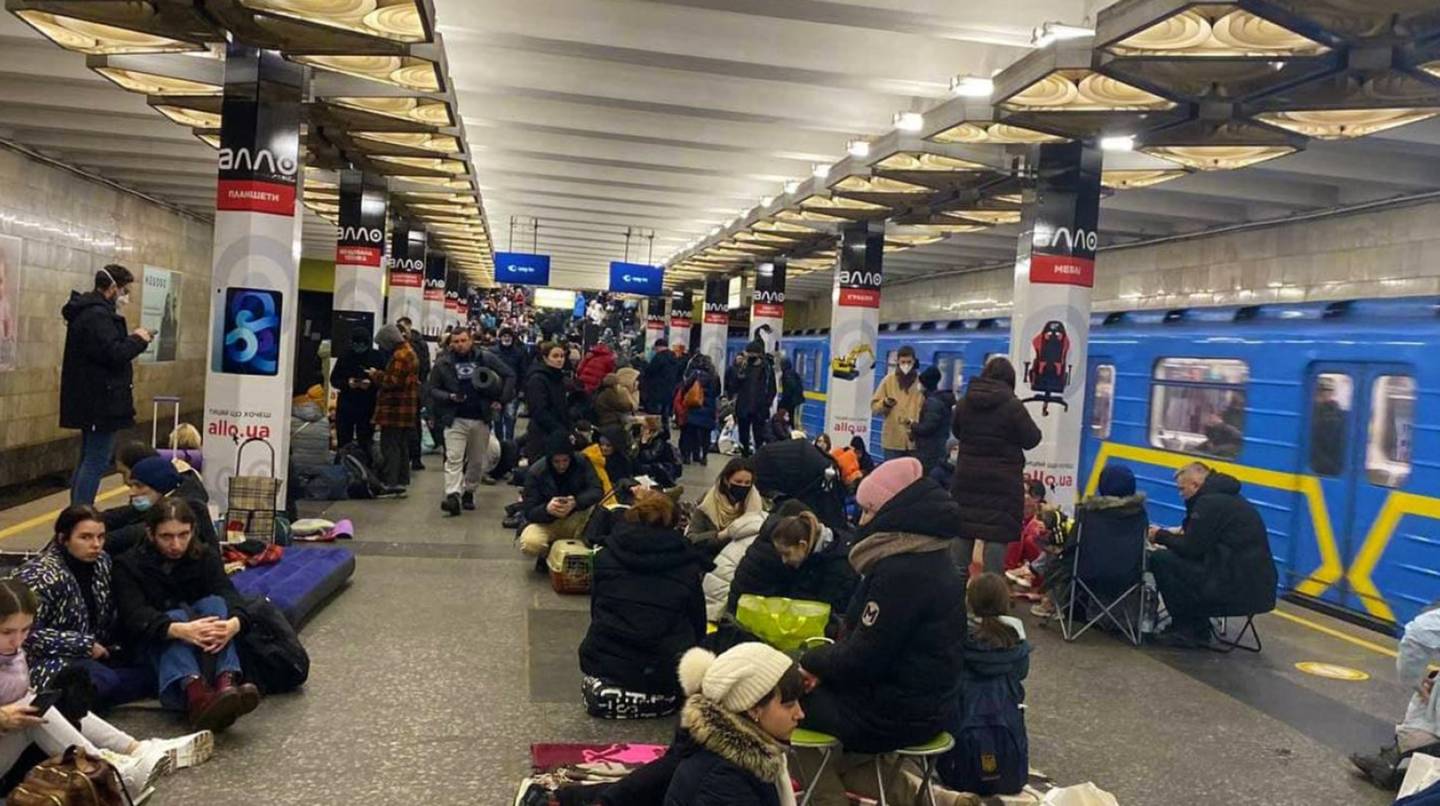
Image caption: Station of Kyiv Metro, converted into an air raid shelter after Russian invasion of Ukraine
Image credit: Wikimedia Commons
Sergey Radchenko, a professor at SAIS and expert in Soviet and Chinese foreign policies, suggested during the panel that Putin similarly miscalculated the effect the invasion would have on Europe, underestimating the international coalition that would form in defense of Ukraine. But the blunder makes Putin no less dangerous, he said. Putin's threats of using nuclear weapons, while a form of military brinksmanship, should still be taken seriously, because "a wild animal cornered is a dangerous animal," Radchenko said.
According to Radchenko, all efforts must be made to negotiate an end to the invasion—which requires keeping the faith that Putin is still a rational actor, capable of compromise. "We should act on the premise that there is still a possibility of reaching a diplomatic settlement," he said, "because the alternative to diplomacy is escalation and war."
Mary Elise Sarotte, an expert in the history of international relations, agreed, citing a military proverb from the Chinese strategist Sun Tzu: "Build your opponent a golden bridge to retreat across." The international community should be looking for incentives for Putin to end his aggression, she said.
Also see
But while she eyes the international community's approach to negotiations with Putin, she is also closely monitoring the popular response to the invasion, she said. As photos poured in from cities across Europe, one photo of a Berlin march caught her eye, where, in the background stood the Brandenburg Gate. "The Brandenburg Gate is where, on Nov. 9, 1989, the power of the people brought down the [Berlin] Wall and brought down tyrants," she said. "I think there is a lesson there for Putin. I think he should be very wary of what he has begun."
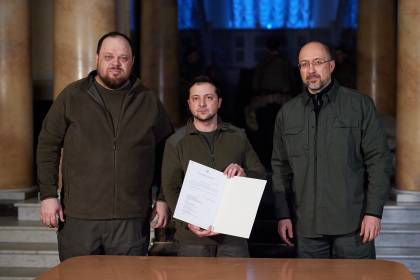
Image caption: Ukrainian President Volodymyr Zelenskyy (center) with chairman of the parliament Ruslan Stefanchuk (left) and Prime Minister Denys Shmyhal officially apply to join the European Union, a largely symbolic gesture that nevertheless signals further political disassociation with Russia.
Image credit: Office of the President of Ukraine
For Eugene Finkel, the dire warning to Putin to beware what he has begun hits close to home. The SAIS associate professor was born in Ukraine and still has friends and family there. Even as he works to coordinate the possible evacuation of loved ones from Ukraine, he shared during the panel a sense of pride in the civilian and military response from his home country.
"Ukraine, I think, surprised many in the West with its resilience and capacity and willingness to fight," Finkel said. "Not people who know Ukraine—it's part of who Ukrainians are—but it certainly surprised people like Putin who did not think of Ukrainians as real people or Ukraine as a liberated state."
Perhaps because of that Ukrainian resilience, Applebaum said, other European nations are now pivoting their responses to the crisis by contributing military equipment and weapons, and increasing defense budgets. Germany has committed vastly more resources to the defense of Ukraine than previously promised—a historic sea change in German defense policy, Applebaum said.
In fact, added Eliot Cohen, professor and former SAIS dean, if there is something hopeful in the catastrophe of Russia's invasion, it is how the international democratic order has responded—through solidarity, strategy, and cooperation. The trouble, he said, is that this battle for the spirit of democracy is being fought on the backs of Ukrainian citizens.
"The people of Ukraine are paying the price for events that may, in the end, make for a better world," Cohen said. "But we should never forget the price that they're paying."
Other panelists at the event were Hal Brands, professor of global affairs; Matthias Matthijs, associate professor of international political economy; John McLaughlin, distinguished practitioner-in-residence and executive director of the Philip Merrill Center for Strategic Studies; Daniel Serwer, senior fellow at the Foreign Policy Institute; and Adam Szubin, distinguished practitioner-in-residence.
Posted in Voices+Opinion, Politics+Society
Tagged international studies, russia, ukraine




